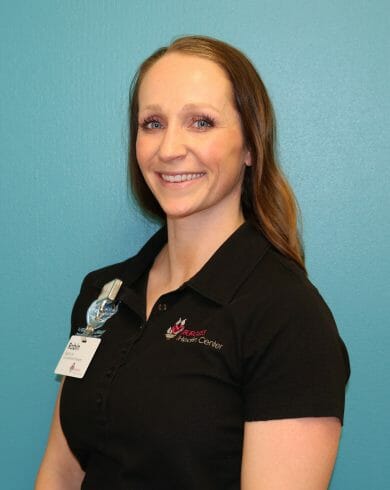
National Occupational Therapy Month
April is National Occupational Therapy Month, to promote awareness of occupational therapy. Burgess Health and Rehabilitation Center is honoring our very own occupational therapist, Robin McLey who is dedicated to improving the lives of her patients.
Read McLey’s responses to common questions about the profession below.
Q.) What is occupational therapy (OT)?
Occupational therapy is more than exercises! Patients that are appropriate for OT vary from musculoskeletal diagnoses to cognitive diagnoses. Occupational Therapists play a vital role in mental health, and many patients may benefit from a referral to OT if they are dealing with mental health issues. Coping mechanisms, therapeutic use of self and interventions that focus on effective communication may be beneficial to a variety of different mental health diagnoses.
Occupational Therapists can also address vision impairments and assist with retraining or adaptations for visual issues. Peripheral vision loss, visual tracking issues, visual attention delays and general safety recommendations for visual changes are just a couple ways OTs can assist with vision issues.
Children can also benefit from OT. Occupational Therapists can assist children in progressing handwriting, grasp and motor skills, and developmental milestones. Sensory interventions are also appropriate for children who have issues with sensory processing. Perhaps a child is having a difficult time with attention to a specific task in the classroom. An OT referral may be beneficial in identifying what is distracting the child and what intervention or treatment options are useful for solving the issue.
Q.) What kind of patients do you typically see?
I play many roles at Burgess and see a variety of different patients. I serve inpatient, outpatient, and home health clients. Goals for my clients vary depending on the setting. In the outpatient setting, I see a variety of upper extremity diagnoses as well as generalized weakness and cognition issues such as memory or problem-solving. Inpatient clients typically present with weakness and issues with their abilities to care for themselves, while my focus for home health is assessing clients’ need for equipment and problem-solving how to make them as safe and independent as possible.
Q.) What is your favorite part of your job?
Easily the patients and people I work with! I love the variety of patients that I see daily, and I enjoy the unique relationship I build with each one of them. I also love my coworkers! At Burgess, we strive to be progressive and innovative. Each one of my coworkers genuinely care about the patients we see and the community we serve.
Burgess Health and Rehabilitation Center is grateful for and appreciative of Robin for her dedication and hard work. Whether you are recovering from surgery, injury, illness, or stroke, let us help you regain your mobility, strength, and daily function.
Ask your family physician for a referral to Burgess Rehabilitation Services today.
